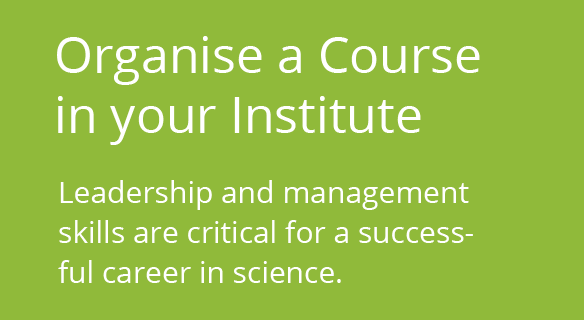< Back to Overview of Course Dates
Laboratory Leadership for Postdocs
Available course dates can be seen here.
THIS IS A 3-DAY PHYSICAL COURSE TAKING PLACE NEAR HEIDELBERG, GERMANY
Because of the Coronavirus pandemic, the following restrictions will apply to this course. Please be sure you are willing to comply before you register:
1. You must show proof of vaccination to be accepted for participation in this course (a photograph/scan of your vaccination document or receipt); a negative test will not be accepted as a substitute for vaccination.
2. Registration is limited to participants resident in EU member states, states associated with Schengen: Iceland, Norway, Switzerland and Liechtenstein, and the UK. You can find out more about current entry restrictions to Germany here: https://www.auswaertiges-amt.de/en/coronavirus/2317268.
The following conditions may apply, depending on government advice and regulations, and our own judgements. Please be sure you are willing to comply in case these measures become necessary:
1. You may be required to take a COVID 'fast test' each morning (we will supply them) and must have a negative result before being permitted into the seminar room. If you cannot agree to testing each day of the course, please do not register.
2. Although the seminar rooms have high efficiency, filtered ventilation, both participants and trainers may be required to wear FFP2 face masks throughout the course. The trainer who is actively facilitating may remove their mask for the duration of their presentation. If you cannot agree to wear a face mask for the duration of the course, please do not register. We will provide face masks.
3. The situation regarding EU-wide travel and the spread of the Coronavirus variants remains hard to predict. We are planning this course on the assumption that we will be able to run it and that you will be able to travel to it without quarantine restrictions. If that situation changes, you will be offered your choice of either a full refund of your course fee (though not your travel costs), or the opportunity to take the course as an online workshop at a lower cost (i.e. with a refund of the difference).
We very much hope that this course can go ahead.
Programme
Notes on Timings:
- All timings are approximate, as we will be working in a process-oriented manner. The time spent on a topic will expand or shrink to meet the needs of the course participants.
- We work from 09.00 to 17.30 on all days except the last day.
- On the last day we work until 16.30.
DAY I 
|
60 mins |
Welcome, Introduction, Warming up Activity: Giving participants time "to arrive" at the workshop and introduce the topics for the course. Open the "Parking Lot" for their questions and issues. |
|
45 mins |
What is leadership? Activity: Participants are invited to reflect on good leaders that they have known and to develop a definition of good leadership. Participants then reflect on their own day-to-day activities to determine for themselves how much of their work is about managing and how much is about leading, and whether they need to develop in some way to achieve the appropriate mix. |
|
120 mins |
The PI / group leader role Activity: Participants are introduced to J.L. Moreno’s ‘Role Theory’ and the ‘Role Atom’ tool. Participants then help one another use the Role Atom to analyse the different roles they play on a daily basis, identify which are important for their success and which are comfortable and uncomfortable. Participants then work on a plan to develop themselves in those roles that are important but uncomfortable. |
|
75 mins |
The impact of working environment Activity: Participants are invited to take on the perspectives of the different groups in their working environment: lab members, PIs, leadership team (e.g. director of institute). The trainers then facilitate a discussion between these three groups. After the discussion, the groups capture the expectations they heard articulated by the other groups and discuss when and how to raise these expectations. |
|
30 mins |
Working with values Activity: Participants are encouraged to reflect on the values present in their work environment, and then to select and discuss 4 or 5 values that they would like to inculcate in their laboratories to ensure productive, fulfilling work. They are introduced to a strategy for implementing these values in their group. |
DAY II
|
60 mins |
Research Integrity Activity: Using the Singapore Statement on Research Integrity as a foundation, participants are asked to reflect on the responsibilities of scientists and to develop practical steps they can take to ensure their research is ethical, accurately documented and reproducible. |
|
60 mins |
Communication Activity: Participants are introduced to E. Bern’s Transactional Analysis model of communication. They are encouraged to consider emotion a normal part of communicating and working with others, and to understand that the emotional content of a conversation needs to be handled skilfully. Participants then work in small groups to practice difficult conversations using the model with the support of the trainers. |
|
45 mins |
Giving feedback and criticism Activity: Participants are introduced to a tool for giving feedback on positive and negative behaviour. They are encouraged to develop a culture of giving and receiving feedback within their groups. They then practise in groups using this tool. |
|
120 mins |
Impact of personality on leadership Activity: Participants are introduced to the concept of Emotional Intelligence and a particular personality model, the Enneagram, to help them develop their own Emotional Intelligence and understand their colleagues and staff better. They develop strategies to solve challenges they are facing using personality as the analytical and creative tool to do so. |
DAY III
|
60 mins |
Team dynamics Activity: Participants are introduced to B. Tuckman’s model of team development. They are then invited to consider the practical steps they could take as a PI at each stage of their group’s development. |
|
30 mins |
Motivation Activity: Participants are introduced to F. Herzberg’s motivation model and are encouraged to reflect on how to use to help their people and themselves achieve states of high motivation. |
|
45 mins |
Delegation Activity: Participants learn about situational leadership and how to use it to adapt the way they delegate specific tasks to different people. |
|
45 mins |
Who's got the monkey? Activity: Participants learn a method related to coaching that helps them help their people solve their own simple problems. |
|
30 mins |
Wrap-up and Next Steps Activity: Participants reflect on the course and what they have learned and develop an action plan to begin to implement some of their new knowledge. |
|
30 mins |
Course Close We say goodbye to one another and close the course. |



